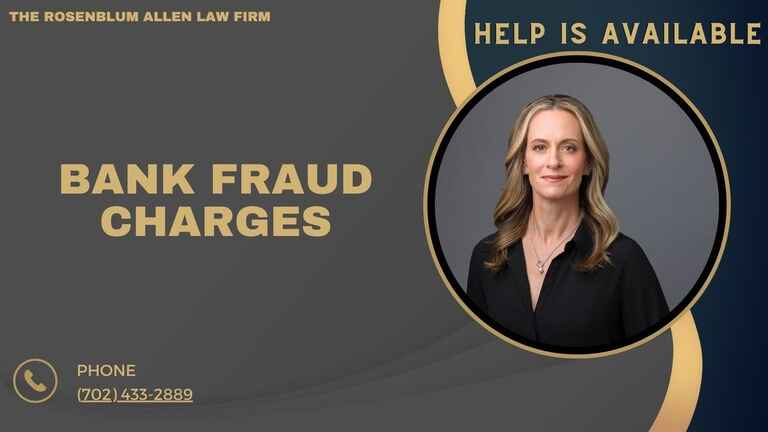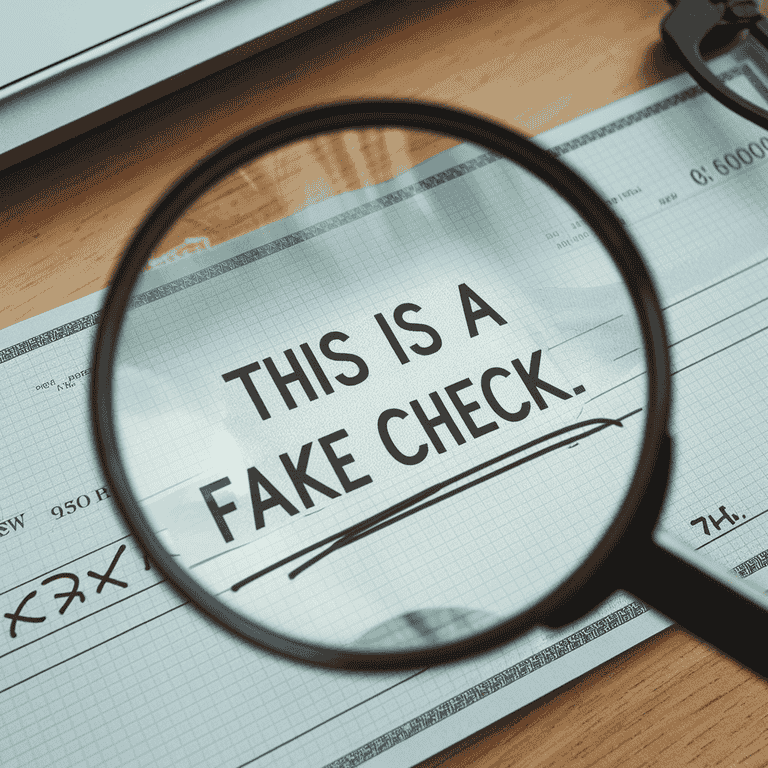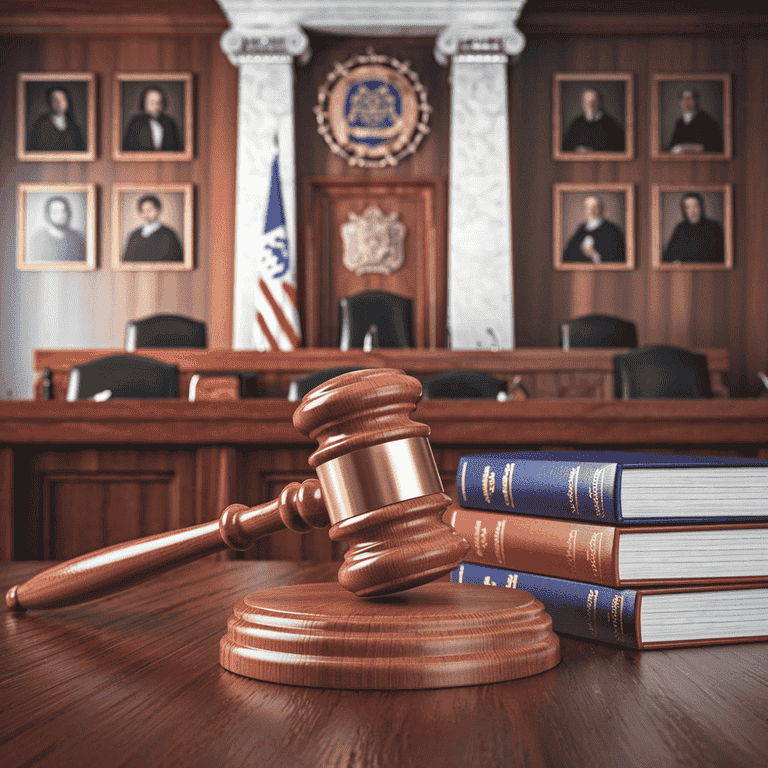What Are Bank Fraud Charges?
Definition of Bank Fraud
Bank fraud is a criminal offense involving deceitful practices to obtain money or assets from a financial institution. It generally involves misrepresentation or concealment of information. When someone uses false statements or deceptive tactics to gain access to bank funds, it typically leads to bank fraud charges.

Types of Bank Fraud Charges
Bank fraud can encompass various illegal activities. Here are some of the most common types of bank fraud charges:
- Check Fraud: Altering or forging checks to withdraw money fraudulently.
- Credit Card Fraud: Using someone else’s credit card information without permission to make unauthorized purchases.
- Wire Fraud: Transmitting funds or information through electronic means with the intent to defraud.
- Loan Fraud: Providing false information on a loan application to obtain funds.
Examples of Bank Fraud Schemes
Understanding the nuances of bank fraud is essential. Here are some typical schemes that lead to bank fraud charges:
- Fake Check Schemes: Creating counterfeit checks to withdraw funds from a bank account.
- Account Takeover: Gaining unauthorized access to a bank account and draining funds.
- Application Fraud: Submitting fraudulent loan or credit applications using false information.
Legal Implications of Bank Fraud Charges
Criminal vs. Civil Charges
Bank fraud can lead to both criminal and civil charges. Criminal charges involve prosecution by the state, which may result in imprisonment. Civil charges typically involve lawsuits filed by financial institutions seeking to recover lost funds.
Potential Penalties and Sentences
The penalties for bank fraud can be severe and vary depending on the specifics of the case. Some potential consequences include:
- Fines: Significant financial penalties can be imposed, often in the thousands or millions.
- Restitution: Offenders may be required to repay the amount fraudulently obtained.
- Prison Time: Convictions can lead to lengthy prison sentences, sometimes exceeding 30 years.
Impact on Personal and Professional Life
Being charged with bank fraud can have far-reaching effects:
- Criminal Record: A conviction will result in a permanent criminal record, impacting future employment opportunities.
- Loss of Professional Licenses: Many professions require licenses that may be revoked upon conviction.
- Social Stigma: The label of a fraud charge can affect personal relationships and reputation.

Common Forms of Bank Fraud
Check Fraud
Check fraud is one of the oldest forms of bank fraud. It often involves forging signatures, altering checks, or using counterfeit checks to withdraw money illegally.
Credit Card Fraud
Credit card fraud includes unauthorized use of someone else’s credit card. This can happen through stolen cards, phishing scams, or data breaches.
Wire Fraud
Wire fraud involves using electronic communication to commit fraud. It can include schemes that trick individuals into wiring money under false pretenses.
Loan Fraud
Loan fraud occurs when applicants provide false information to obtain loans. This can involve inflating income or providing fake documents to qualify for loans.
The Investigation Process
How Bank Fraud Investigations Are Initiated
Bank fraud investigations often begin when a financial institution notices suspicious activity. This could include unusual transactions or patterns that don’t match a customer’s typical behavior. Here’s how the process usually unfolds:
- Red Flags: Banks use software to detect patterns that signal potential fraud. These can include large withdrawals or deposits that seem out of the ordinary.
- Customer Complaints: Sometimes, a customer might report unauthorized transactions. This can trigger an investigation.
- Internal Audits: Regular checks within the bank can uncover discrepancies, leading to a deeper look into a customer’s account.
Role of Financial Institutions in Investigations
Financial institutions play a significant role in the investigation process. They are not just passive observers. Here’s what they do:
- Gather Evidence: Banks collect transaction records and communications related to suspicious accounts. They document everything carefully.
- Report Findings: If fraud is suspected, banks must report their findings to the authorities. This is often done through Suspicious Activity Reports (SARs).
- Collaborate with Law Enforcement: Banks work closely with law enforcement agencies. This partnership helps in gathering more evidence and in ensuring a thorough investigation.
Federal and State Involvement
Bank fraud cases can involve both federal and state authorities. Here’s a breakdown of their roles:
- Federal Agencies: The FBI and the Secret Service often handle major bank fraud cases, especially those involving large sums of money or organized crime.
- State Law Enforcement: Local police or state investigators may handle smaller cases or those involving local banks.
- Joint Task Forces: Sometimes, federal and state agencies work together. This approach allows them to pool resources and expertise, making investigations more effective.

Defenses Against Bank Fraud Charges
Lack of Intent
One common defense is that the accused did not intend to commit fraud. In legal terms, intent is a key factor. If someone genuinely believed they were acting legally, it could be a strong defense.
Mistaken Identity
Sometimes, individuals are wrongly accused due to errors in identity. This can happen if names or account numbers are similar. Proving that the accused is not the person responsible for the fraudulent acts can help clear their name.
Insufficient Evidence
Another effective defense is challenging the evidence presented by the prosecution. If the evidence is weak or circumstantial, it may not be enough to prove guilt beyond a reasonable doubt.
Entrapment
Entrapment occurs when law enforcement induces someone to commit a crime they would not have otherwise committed. If an individual can demonstrate that they were coerced into committing bank fraud, this defense can be quite powerful.
The Role of a Lawyer in Bank Fraud Cases
Importance of Legal Representation
Having a lawyer is vital when facing bank fraud charges. Legal representation can make a significant difference in the outcome of a case. Here’s why:
- Knowledge of the Law: Attorneys understand the nuances of bank fraud laws. They can navigate the legal system effectively.
- Case Strategy: A skilled lawyer can develop a strong defense strategy tailored to the specifics of the case. They can spot weaknesses in the prosecution’s arguments.
- Negotiation Skills: Lawyers are trained negotiators. They can negotiate plea deals or reduced charges on behalf of their clients.
Choosing the Right Attorney
Selecting the right attorney is crucial. Here are some tips to help with the decision:
- Experience: Look for a lawyer who specializes in financial crimes or white-collar crime.
- Reputation: Research their track record. Reviews from past clients can provide valuable insights.
- Communication: Choose someone who communicates clearly and is approachable. You’ll want to feel comfortable discussing sensitive issues.
How an Attorney Can Help Build a Defense
An attorney can assist in various ways to build a solid defense against bank fraud charges:
- Collecting Evidence: They can gather evidence that supports your case, such as transaction records or witness statements.
- Analyzing Prosecution Evidence: A good lawyer will scrutinize the evidence against you and look for inconsistencies or mistakes.
- Preparing for Court: Your attorney will prepare you for what to expect during the trial, helping to alleviate anxiety and confusion.

What to Do if You Are Charged with Bank Fraud
Immediate Steps to Take
Facing bank fraud charges can be overwhelming. Here are some immediate steps to consider:
- Stay Calm: Take a deep breath and assess the situation. Panicking won’t help.
- Seek Legal Counsel: Contact an experienced attorney as soon as possible. They can guide you through the process.
- Gather Documentation: Collect any relevant documents related to your accounts or transactions. This will assist your lawyer in building your case.
Understanding Your Rights
It’s essential to know your rights when charged with bank fraud:
- Right to Remain Silent: You have the right not to speak to law enforcement without a lawyer present.
- Right to Legal Representation: You are entitled to have an attorney represent you during any legal proceedings.
- Right to a Fair Trial: Every individual has the right to a fair trial under the law.
Preparing for Court
Preparation is key for anyone facing court. Here are some ways to get ready:
- Understand the Process: Familiarize yourself with court procedures. Knowing what to expect can reduce anxiety.
- Practice Your Testimony: If you will testify, practice your statements with your lawyer to ensure clarity and confidence.
- Dress Appropriately: First impressions matter. Dress in a professional manner when attending court.
Potential Outcomes of Bank Fraud Cases
Conviction vs. Acquittal
In bank fraud cases, the outcomes can vary significantly. Understanding the possible results is essential for anyone facing such charges.
- Conviction: If the prosecution successfully proves the case, a conviction can lead to various penalties, including fines, restitution, and imprisonment. A conviction can also result in a permanent criminal record, impacting future opportunities.
- Acquittal: If the defense can create reasonable doubt about the charges, the accused may be acquitted. This outcome means the individual is not found guilty, and they can move forward without a criminal record related to the fraud charges.
Sentencing Options
If convicted, the court will determine the sentence. Here are common sentencing options for bank fraud cases:
- Probation: In some cases, a judge may impose probation instead of jail time. During probation, the individual must follow specific conditions, such as regular check-ins with a probation officer.
- Incarceration: For serious offenses, a prison sentence may be necessary. The length of time can vary based on the case’s severity and the individual’s prior record.
- Community Service: Courts may require offenders to complete a certain number of hours of community service as part of their sentence.
Alternatives to Traditional Sentences
There are alternatives to traditional sentencing that courts might consider, depending on the circumstances:
- Restorative Justice Programs: Some jurisdictions offer programs that focus on repairing harm rather than punishment. These programs allow offenders to make amends with victims.
- Sentencing Guidelines: Judges often have discretion in sentencing, which may lead to varied outcomes based on individual circumstances, such as cooperation with authorities or lack of prior offenses.
Appeal Process
If convicted, the accused has the option to appeal the decision. Here’s a brief overview of the process:
- Grounds for Appeal: Appeals can be based on legal errors during the trial, such as improper evidence admission or ineffective assistance of counsel.
- Filing an Appeal: The appeal must be filed within a specific timeframe after the conviction. An appellate court will review the case and may uphold the conviction, reduce the sentence, or order a new trial.
Impact of Plea Bargains
In many bank fraud cases, defendants may choose to negotiate plea bargains with the prosecution. Here’s how this can play out:
- Reduced Charges: A plea bargain may result in lesser charges being filed in exchange for a guilty plea. This can lead to lighter sentences and reduced fines.
- Cooperation Agreements: Defendants might agree to cooperate with law enforcement in exchange for leniency. This can involve providing information about other crimes or fraud schemes.

Breaking It Down for You
Facing bank fraud charges can be a daunting experience. The potential outcomes are serious, ranging from significant fines and prison time to the possibility of an acquittal. Understanding the legal landscape and available options is essential for anyone accused of such offenses.
Being aware of the potential consequences, including the appeal process and alternatives to traditional sentencing, can help individuals navigate this challenging situation. Engaging in plea bargains might also provide a pathway to reduced charges and lighter sentences.
If you or someone you know is dealing with bank fraud charges, seeking legal guidance is vital. A knowledgeable attorney can provide the support needed to navigate the challenges of the legal system and work toward the best possible outcome.
Remember, while the situation may seem overwhelming, there are options available. Taking proactive steps can make a significant difference in the path ahead.

Frequently Asked Questions
What is bank fraud?
Bank fraud involves the illegal use of someone’s personal or financial information to deceive a financial institution for gain. This can include activities such as falsifying information on a loan application, using stolen credit card numbers, or creating counterfeit checks.
How can I defend against bank fraud charges?
Defending against bank fraud charges typically involves challenging the evidence presented by the prosecution. Common defenses may include proving a lack of intent to commit fraud, showing that you were misinformed about the transaction, or demonstrating that you were a victim of identity theft.
What should I do if I am accused of bank fraud?
If you are accused of bank fraud, it is important to remain calm and seek legal counsel immediately. Avoid discussing the case with anyone other than your attorney. Document any relevant information and gather evidence that may support your defense.
What are the signs of bank fraud?
Signs of bank fraud may include unauthorized transactions on your bank statements, unexpected changes to your account, or receiving unfamiliar credit cards or checks. If you notice any suspicious activity, report it to your bank immediately.
Can bank fraud charges be expunged from my record?
In some cases, it may be possible to have bank fraud charges expunged from your criminal record, especially if you were acquitted or the charges were dropped. The process and eligibility vary by state, so consulting with a legal professional is advisable.
How long does a bank fraud case typically take?
The duration of a bank fraud case can vary widely based on several factors, including the complexity of the case, the amount of evidence to be examined, and the court’s schedule. Simple cases might resolve in a few months, while more complex cases could take years.
What penalties are associated with bank fraud convictions?
Penalties for bank fraud convictions can vary based on the severity of the crime and jurisdiction. Convictions may lead to hefty fines, restitution, and prison sentences, which can range from a few years to several decades.
Can I represent myself in a bank fraud case?
While it is legally permissible to represent yourself in a bank fraud case, it is generally not recommended. The complexities of legal proceedings and the potential consequences make it wise to seek the assistance of an experienced attorney.
What impact does a bank fraud conviction have on future employment?
A bank fraud conviction can significantly impact your future employment opportunities. Many employers conduct background checks, and a felony conviction can limit job prospects, particularly in the finance and banking sectors.
How does the appeal process work for bank fraud convictions?
The appeal process involves challenging the conviction or the sentence imposed. A higher court will review the case for legal errors that may have affected the outcome. It’s advisable to work with an attorney who specializes in appeals to navigate this complex process.

Glossary
Bank Fraud: The illegal act of using deceit to obtain money or property from a bank or financial institution.
Identity Theft: A crime where an individual’s personal information is stolen and used without their consent, often to commit fraud.
Counterfeit Checks: Fake checks created with the intent to deceive the bank or the recipient into believing they are legitimate.
Loan Application Fraud: The act of providing false information on a loan application to obtain funds from a lender.
Financial Institution: Any organization that provides financial services, such as banks, credit unions, and investment firms.
Prosecution: The legal party responsible for presenting a case against an individual accused of a crime in a court of law.
Defense: The argument and evidence presented by the accused to refute the charges against them.
Restitution: Compensation required to be paid to victims of a crime for the loss or damage they suffered.
Expungement: The legal process of sealing or removing a criminal record from public view, often allowing individuals to clear their names.
Felony: A serious crime that usually carries a punishment of imprisonment for more than one year or death.
Background Check: A review of an individual’s criminal, commercial, and financial records, often conducted by employers.
Appeal: A legal process in which a convicted person seeks a higher court’s review of the trial court’s decision for errors that may have affected the outcome.
Conviction: A formal declaration that someone is guilty of a criminal offense, typically resulting from a trial.
Restitution: Compensation paid to victims for losses incurred as a result of a crime.
Suspended Sentence: A legal sentence that is not immediately enforced, allowing the offender to serve probation instead of prison time, provided they meet certain conditions.
Victim: An individual who suffers harm, loss, or injury as a result of a criminal act.
Plea Bargain: An agreement in a criminal case where the defendant pleads guilty to a lesser charge in exchange for a lighter sentence or the dismissal of other charges.

Additional Resources for You
In your pursuit of justice and understanding, it’s crucial to have accurate, thorough, and easily accessible information, especially when facing legal challenges. Molly Rosenblum, Esq., our esteemed lead attorney, has meticulously developed a comprehensive set of resources to provide you with essential knowledge and guidance tailored to various aspects of criminal defense law. Here’s a summary of the valuable resources created by Molly Rosenblum, Esq.:
Theft Crime Defense Lawyer: A dedicated resource offering expert legal insights for those accused of theft-related offenses. Explore here.
White Collar Crime: Navigate the complex landscape of white-collar criminal charges and understand your rights and options. Learn more.
Racketeering Charges: Gain insights into the intricacies of racketeering charges and the legal strategies for defense. Read more.
Fraud Charges: Understand the serious implications of fraud charges and explore potential defense approaches. Find out more.
Embezzlement Charges: Get informed about the specific challenges and defense strategies for embezzlement charges. Discover here.
Identity Theft Charges: Learn about the legal aspects of identity theft charges and how to navigate these complex cases. Explore your options.
Larceny Charges: Delve into the specifics of larceny charges and the potential legal avenues for defense. Read more.
Credit Card Fraud Charges: Understand the serious nature of credit card fraud charges and the legal strategies available. Get informed.
Burglary Charges: Familiarize yourself with the legal implications of burglary charges and the defenses that may be employed. Learn the facts.
Robbery Charges: Grasp the severity of robbery charges and explore the potential legal strategies for defense. Know your rights.
Grand Theft Charges: Get detailed information about grand theft charges and understand the potential consequences and defenses. Explore here.
Molly Rosenblum, Esq. is dedicated to providing you with the resources and knowledge you need during challenging times. Each of these resources is tailored to offer specific insights and guidance, ensuring you’re well-equipped to navigate the complexities of your legal situation.

Offsite Resources for You
Federal Bureau of Investigation (FBI) – Bank Fraud: The FBI’s page on bank fraud provides an excellent overview of the crime, its implications, and how the FBI handles such cases.
Federal Deposit Insurance Corporation (FDIC) – Consumer Protection: The FDIC provides resources on how consumers can protect themselves from bank fraud and what to do if they become a victim.
Consumer Financial Protection Bureau (CFPB): The CFPB has numerous resources for consumers about various types of financial fraud, including bank fraud.
U.S. Department of Justice – Fraud Section: The DOJ’s Fraud Section includes information about its efforts to combat bank fraud, including recent cases and initiatives.
National Consumers League – Fraud.org: Fraud.org, run by the National Consumers League, offers advice on avoiding various types of fraud, including bank fraud, and allows for reporting of fraudulent activity.
Always remember to stay informed and cautious to protect yourself against bank fraud.
Why You Haven't Already Hired a Defense Attorney to Help You
Watch this short video to take the next big step toward defending your rights against your felony charge.

A Special Message from Our Lead Attorney

Molly Rosenblum
Dear Reader,
I’m Molly Rosenblum, Esq., and I want to extend my sincere appreciation for taking the time to review our resources on bank fraud charges.
I understand that dealing with these matters can be stressful and often confusing.
It’s my mission to provide valuable information and assistance to individuals like you.
I hope the resources we’ve compiled were helpful and clarified the topic of bank fraud charges.
Remember, you’re not alone in this journey. If you or someone you know is facing bank fraud charges, it’s vital to seek legal advice as soon as possible.
As a step towards understanding your situation better and discussing potential strategies, I invite you to schedule a free consultation with either myself or one of my team members.
Please don’t hesitate to call our office at (702) 433-2889. Our team is ready to provide the support and legal counsel you need.
Thank you again for your time, and I look forward to potentially working with you.
Warm Regards,
Molly Rosenblum, Esq.




